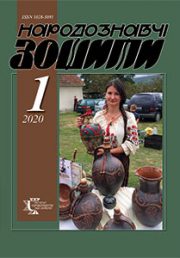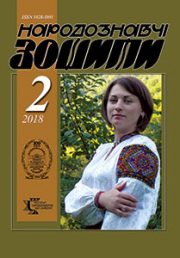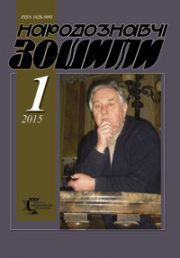The Ethnology Notebooks. 2024. № 5 (179), 992—998
UDK [39+72]-057.4(477)”19/20″Я.Тарас
DOI https://doi.org/10.15407/nz2024.05.992
MULTI-FACETED SCIENTIFIC ACTIVITY OF PROFESSOR YAROSLAV TARAS
DIAKIV Volodymyr
- ORCID ID: https://orcid.org/0000-0002-9513-4364
- PhD of Philological Sciences, Senior Researcher Fellow
- of the Ethnology Institute of the National Academy of Sciences of Ukraine,
- 15, Svobody Avenue, 79000, Lviv, Ukraine;
- Lviv Polytechnic National University, department of the Ukrainian language
- Institute of Humanities and Social Sciences,
- 12, Bandera street, 79013, Lviv, Ukraine,
- Contacts: е-mail: d.v.m.1029@gmail.com
Abstract. Introduction. The relevance of the topic is determined by the anniversary date — the 80th anniversary of the birth of Yaroslav Taras. This is an event of paramount importance, as it provides an opportunity to review the scholar’s scientific heritage, evaluate his contribution to the development of Ukrainian science and culture, and also honor his achievements.
Problem Statement. The object of the study is the most prominent milestones of Yaroslav Taras’s scientific activity, which characterize his versatility and contribution to various fields of knowledge. The subject of the study encompasses the scientific heritage of the scientist in such areas as the study of the genesis of sacred wooden architecture in Ukraine and Moldova, the study of the traditional culture of the radioactively contaminated territories of the Chernobyl zone, as well as his scientific and organizational activities in the position of a Head of the Department of Modern Ethnology at the Institute of Ethnology of the National Academy of Sciences of Ukraine.
Purpose. The purpose of the study is to outline the multi-faceted scientific activity of Yaroslav Taras, a prominent Architect, Ethnologist, Teacher, Laureate of the State Prize of Ukraine in the Field of Architecture, Corresponding Member of the Ukrainian Academy of Architecture, Professor, Doctor of Historical Sciences, and Head of the Department of Modern Ethnology at the Institute of Ethnology of the National Academy of Sciences of Ukraine.
Materials and Methods. The source base of this work consists predominantly of scientific literature on the matter. While analyzing relevant materials, the article uses for the most part comparative-typological and historical-cultural methods, but also structural-typological, geographical and other methods of ethnology to a certain extent.
Conclusion. The article concludes with a discussion of Yaroslav Taras’s undeniably well-deserved recognition in the scientific community. This is evidenced, in particular, by numerous diplomas from the National Academy of Sciences of Ukraine and the Ministry of Emergency Situations, award «For Professional Achievements» from the National Academy of Sciences of Ukraine, letters of thanks and certificates from the Institute of Theory and History of Architecture of Lviv Polytechnic National University, as well as sincere respect and unquestioning authority from colleagues as a result of long-term cooperation and active participation of Yaroslav Taras in field researches.
Keywords: Yaroslav Taras, ethnology, folk architecture, sacred architecture, Institute of National Academy of Sciences of Ukraine, National University «Lviv Polytechnic».
Received 3.09.2024
REFERENCES
- Pavlyuk, S.P. (2015). Unique studies of Ukrainian sacred architecture. The Ethnology Notebooks, 1 (121), 5—8 [in Ukrainian].
- Omeliashko R. (2004). With love for the people and for the profession. The Ethnology Notebooks, 5—6, 816—822 [in Ukrainian].
- Balahutrak, M.P. (2015). Two shoulders of Yaroslav Taras’s scientific activity. The Ethnology Notebooks, 1 (121), 9—15 [in Ukrainian].
- Balahutrak, M.P. (2019). In selfless work for the people and science… (75-year anniversary of Prof. Yaroslav Taras). The Ethnology Notebooks, 6 (150), 1721—1730 [in Ukrainian].






